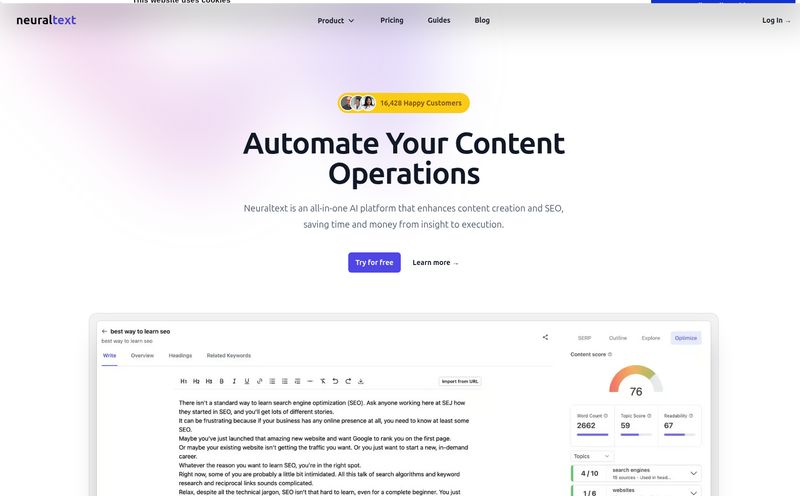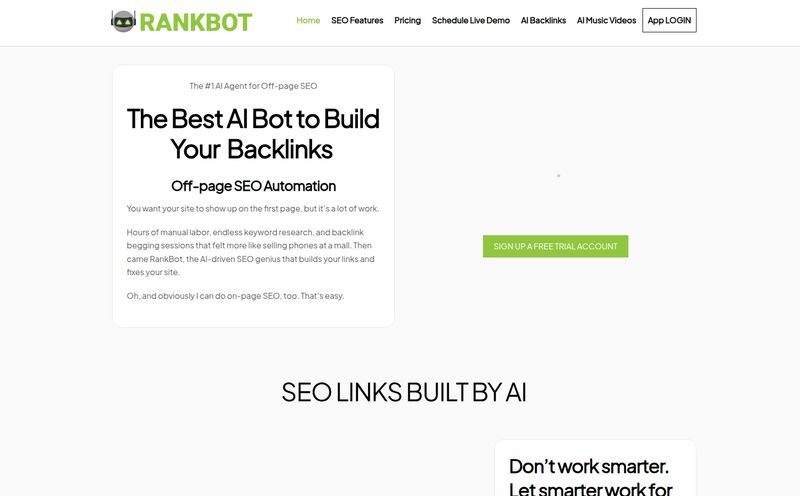The world of SEO and content creation has become a weird, high-stakes game of cat and mouse. On one side, you have AI content generators pumping out articles faster than you can say "keyword research." On the other, you have increasingly sophisticated AI detectors trying to flag that very content. It’s a digital arms race, and we’re all caught in the middle.
For years, I've preached the gospel of 'E-E-A-T' (Experience, Expertise, Authoritativeness, and Trustworthiness). I've always believed that genuine, human-written content will win. And I still do. But I'm also a pragmatist. AI is a tool, and like any good tool, it can be used to make our jobs easier. The problem? Raw AI text often has the personality of a toaster. It's bland, repetitive, and just… off. It screams “I was written by a robot.”
So when I stumbled upon StealthWriter, a platform that claims to not only humanize AI content but also verify it with its own detector, I was intrigued. And skeptical. Very skeptical. Is this the key to blending AI efficiency with human quality, or just another gimmick in a crowded market? I had to find out.
So, What Exactly Is This StealthWriter and ZeroGPT Combo?
Think of StealthWriter as a platform with two distinct, but connected, personalities. It’s a bit like having a talented editor and a strict quality assurance manager in the same app. It's a fascinating approach, I have to say.
The Digital Accent Coach: StealthWriter's Promise
At its core, StealthWriter is an AI text humanizer. You feed it robotic, clunky, AI-generated content, and it rewrites it to sound more natural, engaging, and, well, human. It aims to strip away the tell-tale signs of automation—the predictable sentence structures, the repetitive phrasing—and produce text that can supposedly bypass even the toughest AI detectors. It even boasts support for multiple languages, which is a nice touch.
The Watchful Eye: What is ZeroGPT?
This is the part that really caught my attention. Paired with the humanizer is ZeroGPT, StealthWriter's own AI content detector. After you’ve “humanized” your text, you can immediately check its work. This built-in verification is smart. It shows a level of confidence in their own product and saves you the hassle of bouncing between different tools. They claim it’s a robust detector that can spot content from ChatGPT, Google's Bard, and others. A one-stop shop for writing and verifying. Clever.

Visit ZeroGPT & StealthWriter
Putting It To The Test: My Little Experiment
Talk is cheap, right? So I decided to run a little test. I fired up ChatGPT and asked it to write a 300-word blurb about the benefits of drip irrigation for home gardens. The result was… fine. It was factually correct, grammatically sound, but oh-so-boring. It used the phrase “efficient watering solution” three times. Classic AI.
I copied that text and pasted it straight into StealthWriter. I hit the “Humanize” button and held my breath. A few seconds later, it spat out a new version.
The difference was immediately noticeable. The sentences had more variety. The vocabulary was richer without being pretentious. It replaced “efficient watering solution” with phrases like “delivers hydration right to the roots” and “a smarter way to quench your garden’s thirst.” It felt more like something a gardening enthusiast would actually write. But the real test was yet to come.
I took that newly humanized text and ran it through StealthWriter's own ZeroGPT detector. The result? A 99% human score. Okay, StealthWriter, you have my attention. I ran it through a couple of other third-party detectors I use, and it passed those as well. Color me impressed.
The Million-Dollar Question: Is Using StealthWriter Cheating?
This is where things get sticky. The moment you talk about making AI text “undetectable,” alarm bells go off, especially in academic circles. StealthWriter seems to know this, as they have a very prominent Ethical Use Policy on their site.
They are clear that their tool is designed to be an “AI writing assistant to help improve text quality, enhance readability, and assist with creative writing.” They explicitly forbid using it for academic dishonesty or to bypass plagiarism checkers.
In my opinion? It's all about intent. If you’re a student trying to pass off an AI-written essay as your own, that's cheating. Period. But if you're a marketer, a blogger, or an SEO specialist using AI to generate a rough draft and then using a tool like StealthWriter to refine it, polish it, and inject some life into it… I see that as editing. It’s no different than using Grammarly to fix your grammar or a thesaurus to find a better word. It's a tool to augment your own work, not replace it. Lets be honest, we all need a good editor sometimes.
Things I Genuinely Liked About StealthWriter
After playing around with it for a while, a few things stood out.
- It's More Than a Cloaking Device. The biggest win for me isn't just that it can bypass AI detection; it's that it can genuinely improve the quality of the text. It cleans up awkward phrasing and makes the content more readable and engaging. That has value far beyond just trying to fool an algorithm.
- The Integrated Workflow is a Time-Saver. Not having to copy-paste between a writer and a separate detector tool is a bigger deal than it sounds. It streamlines the process of refining AI-assisted content, making the whole workflow much more efficient.
- It Forces a Human Review. Because you know the tool might slightly alter the meaning, you are forced to read the output carefully. This is an unintended benefit! It ensures a human is always in the loop, which is critical for maintaining accuracy and brand voice.
The Not-So-Perfect Aspects
No tool is perfect, and it’s important to go in with realistic expectations. Here are a couple of things to watch out for.
First, no AI detector is 100% foolproof, and that includes ZeroGPT. The tech is constantly changing, and there can be false positives or negatives. You should see a “human” score as a strong indicator, not an ironclad guarantee. Secondly, and more importantly, StealthWriter can sometimes alter the original meaning of your text. In my drip irrigation test, it worked fine. But if I were working with highly technical, legal, or medical content, I would be extremely cautious. You absolutely must proofread the output to ensure the core facts and nuances remain intact. It’s a powerful editor, but it’s not an expert on your topic.
Let's Talk Money: StealthWriter Pricing
So, what's the damage? StealthWriter operates on a freemium model. There's a free plan, but it's more of a free trial, really. Here's a quick breakdown of their plans.
| Plan | Requests | Price per Month |
|---|---|---|
| Free | 3 requests per month | $0 |
| Pro | 20 requests per day | $3.99 |
| Super Pro | 50 requests per day | $8.99 |
The free plan is pretty restrictive, barely enough to test the waters. The Pro and Super Pro plans, however, are very reasonably priced, especially when you consider the time they can save. For a professional content creator, a few bucks a month is a no-brainer if the tool delivers.
Who Is This Tool Really For?
After all my testing and thinking, I've landed on a clear picture of the ideal StealthWriter user. This isn't for the student trying to pull a fast one. This is for the busy content professional: the SEO blogger, the social media manager, the email marketer, the affiliate marketer. It’s for anyone who uses AI to overcome writer’s block or produce first drafts but understands the critical need for a human touch to finalize the content. It's for people who want to work smarter, not harder, without sacrificing quality or risking getting flagged by platforms that frown on purely robotic content.
My Final Verdict on StealthWriter
So, is StealthWriter the ultimate secret weapon? It's a powerful one, for sure. It’s a well-designed, thoughtful tool that addresses a very real problem in the content world. The combination of an effective AI humanizer with an integrated detector is a winning formula.
It’s not a magic wand, though. You can't just blindly trust its output. It requires responsible use and careful proofreading. But as a high-powered editing assistant that helps you refine AI drafts into something with more personality and flair? Yeah, it’s pretty darn good. It has earned a spot in my digital toolbox, and in this crazy, fast-moving industry, I’ll take any advantage I can get.
Frequently Asked Questions
Is StealthWriter free to use?
StealthWriter offers a very limited free plan with 3 requests per month. For any serious usage, you'll need to subscribe to one of their paid plans, like the Pro or Super Pro, which are quite affordable.
Can StealthWriter really bypass all AI detectors?
It's designed to be highly effective at making text sound human and it performs very well, often passing major detectors. However, the technology is always evolving, so no tool can offer a 100% guarantee. Always use it as a tool to improve quality first and foremost.
Will StealthWriter change the meaning of my content?
There is a risk of this, especially with complex or technical topics. The tool rewrites sentences for better flow and vocabulary. It is absolutely crucial that you review the output to ensure your original meaning and key facts are preserved.
Is using StealthWriter a form of plagiarism?
No. Plagiarism is presenting someone else's work as your own. StealthWriter is a rewriting and editing tool. However, using it to be deceptive in an academic setting would be unethical and against their terms of service.
What is the difference between StealthWriter and ZeroGPT?
They are two sides of the same coin offered by the platform. StealthWriter is the tool that rewrites and “humanizes” AI-generated text. ZeroGPT is the tool that detects whether a piece of text was written by an AI.
How accurate is the ZeroGPT detector?
Based on my tests and its reputation, ZeroGPT is one of the more accurate and reliable AI detectors available. Like all detectors, it isn't infallible, but it serves as a very strong benchmark for the quality of the “humanized” text.
Reference and Sources
- StealthWriter Official Website: https://stealthwriter.ai/
- Google Search's guidance about AI-generated content: https://developers.google.com/search/blog/2023/02/google-search-and-ai-content



